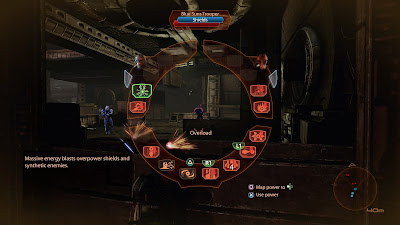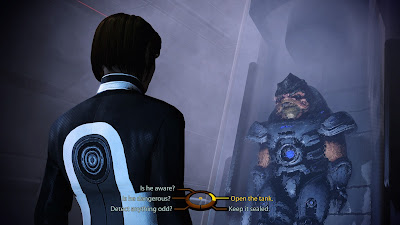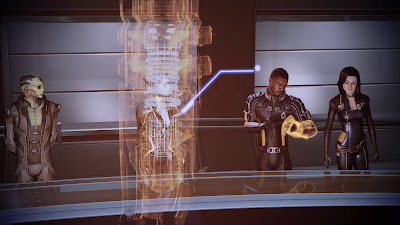Original Release: Jan. 26, 2010 for XBox 360, PC. Version Reviewed: PS4 Legendary Edition, 2021.
THE PLOT:
In the aftermath of the attack on the Citadel, Commander Shepard and the Normandy are sent to deal with the remaining pockets of enemy Geth. This mission comes to an abrupt end when they come under attack by an unknown enemy, a vast ship whose weapons cut through the prize of the Alliance fleet like a knife through butter. Many among the crew survive, making it to escape pods... but Shepard is killed.
Enter Cerberus. Once an Alliance black ops unit gone rogue, it has become a private entity. It's still officially despised, but it's also well-connected and remarkably well-funded. Cerberus's leader, the Illusive Man (Martin Sheen), shares Shepard's concerns about the Reaper threat, and has given top operative Miranda Lawson (Yvonne Strahovski) essentially unlimited resources to bring Shepard back to life, with no alterations in either memory or personality.
Two years later, these efforts bear fruit: Shepard wakes up in a Cerberus lab. Though wary about working with Cerberus, Shepard cannot ignore the crisis. A mysterious race known as "The Collectors" has been attacking human colonies, leaving each world devoid of survivors or even corpses. Their objective is unknown, but the Illusive Man suspects a connection with the Reapers.
Given command of a new and improved Normandy, Shepard begins gathering allies to attack the Collectors where they live. Then an encounter with the enemy results in a startling revelation: It was the Collectors who destroyed the first Normandy two years earlier. And that is only the first of the surprises to come...
 |
| Shepard reconnects with some old friends - and makes a few new ones along the way. |
CHARACTERS:
The single largest improvement made for Mass Effect 2 is in the characters. Returning cast members are more sharply defined than in the first game. Liara and Tali, who were both portrayed too much in "babe in the woods" terms, are remade as decisive individuals. Liara has shifted from archaeologist to information broker, better positioning her to be a key part of the story, and she shows flashes of ruthlessness. Tali is now leading missions for the Quarian migrant fleet, and she is more assertive and decisive than before. Kaidan and Ashley, the least interesting members of the first game's crew, appear only briefly, but they are also much improved. Raphael Sbarge's Kaidan is particularly strong in his major scene, reacting to Shepard's new association with Cerberus as if to a personal betrayal.
Several new characters are introduced. My personal favorite of these is Mordin Solus, a brilliant Salarian scientist whose chipper attitude hides mixed emotions about his past work; he vigorously defends his previous work adapting the Krogan genophage, but he seems to be trying to convince himself as much as Shepard. Dying assassin Thane is haunted by the death of his wife and by his estrangement from his son, and his species (the Drell) is blessed/cursed by the ability to re-experience memories as if living them for the first time. Krogan Grunt has no real layers, basically wanting to just smash things and fight enemies, but that very simplicity makes his every line and action fun. Finally, Tricia Helfer's EDI, the Normandy's "shackled" AI, proves to be a dryly humorous delight, particularly when paired with Seth Green's Joker.
Not every character engaged me. Miranda is well-scripted, with her own issues and contradications, and actress Yvonne Strahovski is good in the role. That said, across multiple playthroughs, I have never once found the character compelling, and her default outfit is the kind of video game fanservice that always annoys me. Justicar Samara is also well-voiced and well-scripted, and is also a character I just don't connect with. Meanwhile, Jack - the edgy, tough loner of the crew - seems to have been precisely scripted to hit every character beat that I find grating. All she's missing are the daddy issues (which were given to Miranda and Jacob).
Speaking of Jacob... I think he's meant to be this game's Kaidan: the primary male supporting character and default love interest for female Shepards. I suspect most female Shepards hold out for Garrus... or Thane... or Liara in a DLC... or celibacy. Jacob is so bland that I took to avoiding the ship's armory to limit my interactions with him. Suffice it to say: Two games in, and Mass Effect has its worst character, one that I suspect the series is unlikely to outdo.
 |
| Cover shooting hordes of generic enemies before advancing to the next room. There is FAR too much of this. |
COMBAT:
Unlike the first Mass Effect, the second game's combat was not adjusted for the Legendary Edition re-release. This may be unfortunate, at least from my perspective, as I am no fan of Mass Effect 2's combat.
There are minor but persistent control issues. To reliably enter cover requires the press of a button - the same button used to vault over objects. For me, at least, this too often resulted in me attempting to duck into cover and instead jumping over it into enemy fire. In addition, squadmates will intermittently ignore your commands. Having to order Mordin to "Burn" an enemy three times before he actually does it is annoying - particularly when that enemy is in the process of charging me!
Even more irritating is the structure of the battles. Mass Effect 2's combat is extremely repetitive, at least in the main game (some of the DLCs improve on it). Every battle seems to invoke "horde mode," with the player crouching behind cover to recharge shields while blasting through wave upon wave of generic bad guys.
There's not even much challenge to most of this. You take cover and snipe enemies for ten minutes or so until the field is clear. Then you advance to the next room, where you take cover and snipe enemies again. Eventually, you'll get to a boss... whom you will almost invariably defeat by taking cover and sniping it - though some bosses mix it up by making you run from one bit of cover to the next in between taking your shots. After the boss is defeated, you are rewarded with a cutscene. The game rarely deviates from this structure, and after while it becomes... well, boring.
 |
| The most enjoyable part of the gameplay: Making choices that affect the story. |
ADDITIONAL GAMEPLAY:
RPG elements have been greatly stripped back from the first game. This isn't all bad. The first game had a cumbersome inventory system, one which would periodically send me combing through my gear to "reduce to omnigel" all low-level items. That's gone here; when you pick up a higher-level item, it effectively replaces the lower-level version, and you can change and upgrade gear between missions. It's cleaner and quicker, and nothing of value is lost.
The streamlining does carry some disadvantages. There are fewer skills in Mass Effect 2, which gives players less ability to customize characters. You cannot swap out armor. You can adjust a few things, such as an armor's shoulders or textures - but only for Shepard, and not for any of the companions.
The most enjoyable aspect of the game remains making choices. How Shepard responds to situations and conversations can change squadmate loyalty and even the results of individual missions. More often, these decisions are cosmetic, but they still give you a chance to decide who your Shepard is. Whether your Shepard is wary of Cerberus or completely drinks their "pro-human" Kool-Aid has little affect on the story, but it will change the way you view the overall experience.
Finally, an enhancement has been added to the Paragon/Renegade system: interrupts. During cutscenes, a blue Paragon symbol or a red Renegade one will appear on screen. Pulling the appropriate trigger will change the direction of the cutscene. Paragon interrupts will usually involve trying to peacefully resolve an issue or offering comfort; Renegade interrupts involve more direct action, with often very entertaining results.
 |
| A Quarian tribunal. Hypocrisy is not exclusive to humanity. |
A MORE LIVED IN AND CINEMATIC UNIVERSE...:
Mass Effect 2 does important work in terms of making its fictional universe feel more textured and lived in. The dialogue is sharper, the characters feel more alive, and we get more of a sense of the internal conflicts and divisions within each culture.
The first game mentioned the Krogan homeworld and the Quarian fleet; this game takes us to both places, revealing the petty rivalries and hypocrisies that exist there. In the first game, Liara mentioned that Asari "pure bloods" such as herself are looked down upon. This game expands on that, introducing the Ardat-Yakshi, who are Asari suffering from a genetic disorder that is deadly to those they come into contact with, and that is also exclusive to pure bloods. Even the Geth get additional development, as we learn that these AI enemies are far from the monolith the first game had implied.
Visuals are more cinematic. Cutscenes simulate zooms, rapid pans, focus shifts, and even handheld camerawork at various points. Even in-engine visuals feature more detail in backgrounds, with a more generally dynamic use of color, and (this being 2010) J. J. Abrams-style lens flare. The trade-off comes with a few too many corridors and office buildings; but there's no question that this game draws you in visually much more strongly than the first one did.
 |
| Shepard's new enemy: The Collectors. The game could have used more of them. |
...BUT NOT WITHOUT ITS PROBLEMS:
While this game makes me feel more connected to the characters and their universe than the first one did, there are issues that hold it back from being a triumph. I've already mentioned the combat structure, which is repetitive to the point of tedium.
There's also Yeoman Kelly Chambers, a supposedly highly trained psychologist meant to help Shepard gain insight into the crew. She gains new dialogue every time a crew member is added. Unfortunately... Well, let me paraphrase 80% of what she says: "I'd like to sleep with you, him, her, and it!" I suspect even some twelve-year-old boys playing this began wishing for her to give it a rest.
Mass Effect 2's biggest issue, however, is its plot.
The story is basically this: Shepard recruits a group of misfits from various backgrounds; they gradually become a team; and they embark on a mission where death seems the most likely outcome. Yes, it's Seven Samurai in space. This is a perfectly fine template, and the characters' loyalty missions help to fill in a lot of detail about the various races of Mass Effect. But there are too many characters, and their issues are mostly unrelated to the Collector plot - and after a while, the Collectors start to feel practically like an afterthought.
For the first third or so, the game does a decent job of balancing the character missions with story progression. The first full mission establishes the Collectors as a threat. An early recruitment mission namechecks them. After you've recruited about a third of available characters, the story advances by having you deal with a Collector attack. After another handful of missions, you encounter the Collectors face-to-face, at which point a massive plot twist is revealed.
And then... nothing. This is the approximate midpoint of the game - and at this point, it will take most players a good 15 - 20 hours before the Collectors are a factor in any way other than an occasional namecheck. I can't help but feel that one more beat was needed to keep them alive as a threat.
A major contributor to this problem is cast glut. A couple of squad members are optional; other squad members can die. As a result, the game developers had to build some redundancy into the final mission. Unfortunately, if you add in DLC characters Zaeed and Kasumi, you can (and I suspect most players will) go into that final assault with eleven squad mates. The nine main game squad members have two missions each: one for recruitment, one for loyalty. Zaeed and Kasumi receive one mission each. That comes to a total of twenty missions!
Don't get me wrong: Some of these missions are very good, and a few are even great. Tali's loyalty mission may be my favorite part of the game; Mordin's isn't far behind, with some outstanding character writing and superb voice acting by Michael Beattie; and Thane's mixes up the gameplay with a fun stealth section. Others are... less good. The real problem isn't variable quality, however. The problem is that all of these missions end up feeling like individual episodes, as if from a weekly television series. Twenty such episodes is a bit much, and the sense of urgency so well created in the early levels can't help but be drained away.
 |
| The Normandy crew plans its final assault. |
THE FINAL MISSION:
All of that said, the main game ends with an absolute triumph: The assault on the Collector Base. This is the mission the entire game has been building toward, and everything about it works.
First, it acts as a synthesis of all the choices you've made throughout the game. Which (if any) upgrades you made to the Normandy will determine how the approach to the base goes. If you skipped that annoying scanning mini-game, then be prepared to start the mission with a half-wrecked ship and a depleted squad. From there, choices you've made that have either gained or lost the team's loyalty will affect how each phase of the mission goes.
Oh, and if you did everything perfectly up to this point? You can still lose squad members if you assign the wrong people to critical roles during the mission. In some cases, the assignment calls are easy - but other cases come down to multiple seemingly valid options, not all of which will net an ideal result.
Add in a terrific, adrenaline-pumping score, a last moral decision, and a final boss that offers one of the game's few reasonably imaginative battles, and this entire sequence is a masterpiece.
 |
| Mordin sings, in one of many fine character scenes. |
OVERALL:
I have very mixed feelings about Mass Effect 2. It is definitely a good game overall, and the series is much the better for its existence. It improves on its predecessor's characterizations, expands and deepens the fictional universe, and delivers a more cinematic look.
I think it falls short of being a great game, though. There are too many squadmates, and I think there would be more focus if 2 - 3 characters had been culled. The combat is so repetitive that it quickly becomes tedious, and about half the game's running time is spent in that combat. Finally, the Collector story loses momentum as it vanishes for entirely too many hours of the mid-game.
The good outweighs the bad, and the main game ends on a high note after a final mission that is a triumph of good game design. Still, if pressed (and if memories of the third game hold), I would likely label this as my least favorite of the trilogy.
Overall Rating: 7/10.
Mass Effect 2 DLC
Previous Game: Mass Effect
Next Game: Mass Effect 3
Review Index
To receive new review updates, follow me:
On BlueSky:
On Threads:



No comments:
Post a Comment